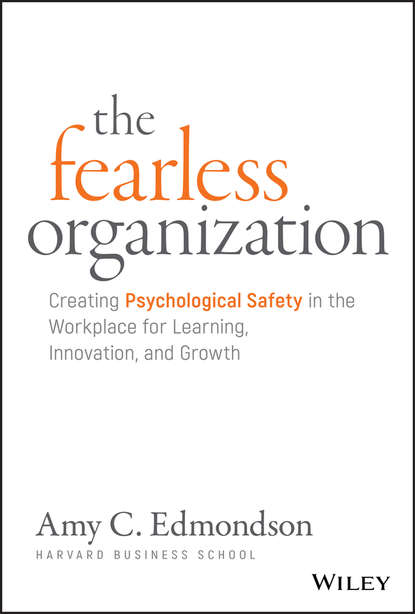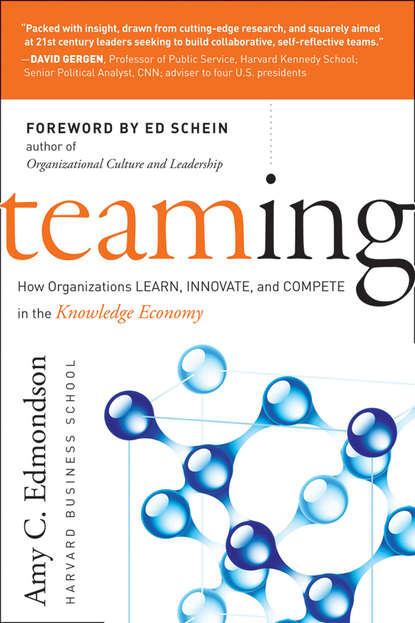Поиск:
Войти
Книги автора: Эми Эдмондсон
Сортировка
- сначала новые
- сначала новые
- по рейтингу
- по просмотрам
- по названию
Добавлено
Год выхода: 2021
Язык: Русский
Страх – мощный психологический кляп, который в некоторых (а на самом деле, во многих) компаниях стан…
Страх – мощный психологический кляп, который в некоторых (а на самом деле, во многих) компаниях становится частью рабочего костюма. И дело не только в боязни наказания или увольнения. Люди молчат, чтобы не попасть в неловкое положение, не потерять лицо или не оказаться гонцом с плохими новостями. Нежелание расстроить или оскорбить начальника – тоже нередкая причина, по которой сотрудники предпочитают держать свое мнение при себе.
Почему это опасно для бизнеса? Почему упал космический шаттл, столкнулись самолеты и чуть не пошли ко дну такие гиганты, как Volkswagen и Nokia? Эми Эдмондсон, профессор лидерства и менеджмента Гарвардской школы бизнеса, на множестве примеров из самых разных отраслей доказывает, что психологическая безопасность влияет не только на финансовые показатели организации, но и в отдельных случаях позволяет избежать краха и настоящих трагедий.
Конечно, не каждая идея хороша и не каждый вопрос уместен, но гораздо хуже, когда сотрудники боятся высказывать любые идеи, задавать вопросы или сообщать о проблемах. Сегодня жизненно важно создавать в организациях такую среду, в которой межличностный климат не приводит к подавлению, замалчиванию, высмеиванию или запугиванию. Чтобы в компании всегда находилось место инновациям, требуется атмосфера, способствующая взаимному обмену знаниями между людьми! А знания – это в том числе сомнения, вопросы, ошибки и неудачи.
Не бойтесь услышать правду, не стремитесь только к хорошим новостям! Начните строить свободную от страха культуру уже сейчас, и очень скоро ваш бизнес получит сильнейший заряд знаний, идей и инноваций!
Скачать бесплатно в формате mp3!
Добавлено
Год выхода: 2019
Язык: Русский
Страх – мощный психологический кляп, который в некоторых (а на самом деле, во многих) компаниях стан…
Страх – мощный психологический кляп, который в некоторых (а на самом деле, во многих) компаниях становится частью рабочего костюма. И дело не только в боязни наказания или увольнения. Люди молчат, чтобы не попасть в неловкое положение, не потерять лицо или не оказаться гонцом с плохими новостями. Нежелание расстроить или оскорбить начальника – тоже нередкая причина, по которой сотрудники предпочитают держать свое мнение при себе.
Почему это опасно для бизнеса? Почему упал космический шаттл, столкнулись самолеты и чуть не пошли ко дну такие гиганты, как Volkswagen и Nokia? Эми Эдмондсон, профессор лидерства и менеджмента Гарвардской школы бизнеса, на множестве примеров из самых разных отраслей доказывает, что психологическая безопасность влияет не только на финансовые показатели организации, но и в отдельных случаях позволяет избежать краха и настоящих трагедий.
Конечно, не каждая идея хороша и не каждый вопрос уместен, но гораздо хуже, когда сотрудники боятся высказывать любые идеи, задавать вопросы или сообщать о проблемах. Сегодня жизненно важно создавать в организациях такую среду, в которой межличностный климат не приводит к подавлению, замалчиванию, высмеиванию или запугиванию. Чтобы в компании всегда находилось место инновациям, требуется атмосфера, способствующая взаимному обмену знаниями между людьми! А знания – это в том числе сомнения, вопросы, ошибки и неудачи.
Не бойтесь услышать правду, не стремитесь только к хорошим новостям! Начните строить свободную от страха культуру уже сейчас, и очень скоро ваш бизнес получит сильнейший заряд знаний, идей и инноваций!
Добавлено
Год выхода: 2018
Язык: Английский
Conquer the most essential adaptation to the knowledge economy Psychological Safety at Work: How to …
Conquer the most essential adaptation to the knowledge economy Psychological Safety at Work: How to Ensure Learning and Innovation in the Knowledge Economy offers practical guidance for teams and organizations who are serious about success in the modern economy. With so much riding on innovation, creativity, and spark, it is essential to attract and retain quality talent—but what good does this talent do if no one is able to speak their mind? The traditional culture of “fitting in” and “going along” spells doom in the knowledge economy. Success requires a continuous influx of new ideas, new challenges, and critical thought, and the interpersonal climate must not suppress, silence, ridicule or intimidate. Not every idea is good, and yes there are stupid questions, and yes dissent can slow things down, but talking through these things is an essential part of the creative process. People must be allowed to voice half-finished thoughts, ask questions from left field, and brainstorm out loud; it creates a culture in which a minor flub or momentary lapse is no big deal, and where actual mistakes are owned and corrected, and where the next left-field idea could be the next big thing. This book explores this culture of psychological safety, and provides a blueprint for bringing it to life. The road is sometimes bumpy, but succinct and informative scenario-based explanations provide a clear path forward to constant learning and healthy innovation. Explore the link between psychological safety and high performance Create a culture where it’s “safe” to express ideas, ask questions, and admit mistakes Nurture the level of engagement and candor required in today’s knowledge economy Follow a step-by-step framework for establishing psychological safety in your team or organization Shed the “yes-men” approach and step into real performance. Fertilize creativity, clarify goals, achieve accountability, redefine leadership, and much more. Psychological Safety at Work: How to Ensure Learning and Innovation in the Knowledge Economy helps you bring about this most critical transformation.
Добавлено
Год выхода: 2018
Язык: Английский
New breakthrough thinking in organizational learning, leadership, and change Continuous improvement,…
New breakthrough thinking in organizational learning, leadership, and change Continuous improvement, understanding complex systems, and promoting innovation are all part of the landscape of learning challenges today's companies face. Amy Edmondson shows that organizations thrive, or fail to thrive, based on how well the small groups within those organizations work. In most organizations, the work that produces value for customers is carried out by teams, and increasingly, by flexible team-like entities. The pace of change and the fluidity of most work structures means that it's not really about creating effective teams anymore, but instead about leading effective teaming. Teaming shows that organizations learn when the flexible, fluid collaborations they encompass are able to learn. The problem is teams, and other dynamic groups, don't learn naturally. Edmondson outlines the factors that prevent them from doing so, such as interpersonal fear, irrational beliefs about failure, groupthink, problematic power dynamics, and information hoarding. With Teaming, leaders can shape these factors by encouraging reflection, creating psychological safety, and overcoming defensive interpersonal dynamics that inhibit the sharing of ideas. Further, they can use practical management strategies to help organizations realize the benefits inherent in both success and failure. Presents a clear explanation of practical management concepts for increasing learning capability for business results Introduces a framework that clarifies how learning processes must be altered for different kinds of work Explains how Collaborative Learning works, and gives tips for how to do it well Includes case-study research on Intermountain healthcare, Prudential, GM, Toyota, IDEO, the IRS, and both Cincinnati and Minneapolis Children's Hospitals, among others Based on years of research, this book shows how leaders can make organizational learning happen by building teams that learn.
Добавлено
Год выхода: 2018
Язык: Английский
Conquer the most essential adaptation to the knowledge economy Psychological Safety at Work: How to …
Conquer the most essential adaptation to the knowledge economy Psychological Safety at Work: How to Ensure Learning and Innovation in the Knowledge Economy offers practical guidance for teams and organizations who are serious about success in the modern economy. With so much riding on innovation, creativity, and spark, it is essential to attract and retain quality talent—but what good does this talent do if no one is able to speak their mind? The traditional culture of “fitting in” and “going along” spells doom in the knowledge economy. Success requires a continuous influx of new ideas, new challenges, and critical thought, and the interpersonal climate must not suppress, silence, ridicule or intimidate. Not every idea is good, and yes there are stupid questions, and yes dissent can slow things down, but talking through these things is an essential part of the creative process. People must be allowed to voice half-finished thoughts, ask questions from left field, and brainstorm out loud; it creates a culture in which a minor flub or momentary lapse is no big deal, and where actual mistakes are owned and corrected, and where the next left-field idea could be the next big thing. This book explores this culture of psychological safety, and provides a blueprint for bringing it to life. The road is sometimes bumpy, but succinct and informative scenario-based explanations provide a clear path forward to constant learning and healthy innovation. Explore the link between psychological safety and high performance Create a culture where it’s “safe” to express ideas, ask questions, and admit mistakes Nurture the level of engagement and candor required in today’s knowledge economy Follow a step-by-step framework for establishing psychological safety in your team or organization Shed the “yes-men” approach and step into real performance. Fertilize creativity, clarify goals, achieve accountability, redefine leadership, and much more. Psychological Safety at Work: How to Ensure Learning and Innovation in the Knowledge Economy helps you bring about this most critical transformation.
Добавлено
Год выхода: 2018
Язык: Английский
New breakthrough thinking in organizational learning, leadership, and change Continuous improvement,…
New breakthrough thinking in organizational learning, leadership, and change Continuous improvement, understanding complex systems, and promoting innovation are all part of the landscape of learning challenges today's companies face. Amy Edmondson shows that organizations thrive, or fail to thrive, based on how well the small groups within those organizations work. In most organizations, the work that produces value for customers is carried out by teams, and increasingly, by flexible team-like entities. The pace of change and the fluidity of most work structures means that it's not really about creating effective teams anymore, but instead about leading effective teaming. Teaming shows that organizations learn when the flexible, fluid collaborations they encompass are able to learn. The problem is teams, and other dynamic groups, don't learn naturally. Edmondson outlines the factors that prevent them from doing so, such as interpersonal fear, irrational beliefs about failure, groupthink, problematic power dynamics, and information hoarding. With Teaming, leaders can shape these factors by encouraging reflection, creating psychological safety, and overcoming defensive interpersonal dynamics that inhibit the sharing of ideas. Further, they can use practical management strategies to help organizations realize the benefits inherent in both success and failure. Presents a clear explanation of practical management concepts for increasing learning capability for business results Introduces a framework that clarifies how learning processes must be altered for different kinds of work Explains how Collaborative Learning works, and gives tips for how to do it well Includes case-study research on Intermountain healthcare, Prudential, GM, Toyota, IDEO, the IRS, and both Cincinnati and Minneapolis Children's Hospitals, among others Based on years of research, this book shows how leaders can make organizational learning happen by building teams that learn.
1
Популярные книги
















